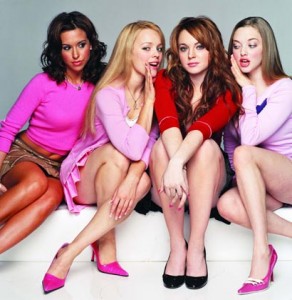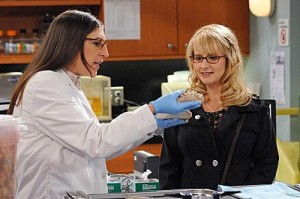 We’ve all heard of the Bechdel test, right? No? To be honest, I had no idea what it was until I stumbled onto a page about it on TV Tropes. But here’s the short version for you lazy bums that don’t feel like Googling: in order for a movie or TV series to pass the test, it must have at least two female characters, who have at least one conversation about anything other than a man or men in general. Whether they spend thirty minutes of the movie calling men pigs or discussing their daddy issues is irrelevant. The movie fails if they don’t chat about say,, Pizza (including toppings, sauces, but not the delivery boy), make-up or anything else not in possession of male reproductive organs.
We’ve all heard of the Bechdel test, right? No? To be honest, I had no idea what it was until I stumbled onto a page about it on TV Tropes. But here’s the short version for you lazy bums that don’t feel like Googling: in order for a movie or TV series to pass the test, it must have at least two female characters, who have at least one conversation about anything other than a man or men in general. Whether they spend thirty minutes of the movie calling men pigs or discussing their daddy issues is irrelevant. The movie fails if they don’t chat about say,, Pizza (including toppings, sauces, but not the delivery boy), make-up or anything else not in possession of male reproductive organs.
A movie will pass the test even if it’s a horribly mysoginistic movie, because it’s not something that gives us, the viewers, an accurate account of the feminism levels of whatever it is that we’re seeing on screen: merely that the female characters have, for however long or short, thoughts that gravitate to something other than praising men, bashing men, describing men, and so on.
Sweden seems to want to take this a step further, and add a Bechdel Test rating to their movies. Is it useful? Is it merely a result of someone’s overly politically correct idea? Only time will tell, but given the apparent flaws of this test in itself or of the rating system that’s meant to suddenly teach us all how gender biased a movie is, I’m going to hold off on saying it’s a good idea. Say you’re a feminist, whether you’re male or female, and you decide to go to a movie theatre in Stockholm to see a movie that gets an A rating (which is a pass), only to be met with a movie that features two ditzy girls/women, in pursuit of happiness, that spend two hours doing nothing but lounge on a beach, chatting about the latest flavour of bubblegum. It’s not exactly what you would’ve expected from a movie that passed the test, mostly because it’s still a misunderstood tool.
The aim of this initiative is, supposedly, to “force” movie makers all around the world to change their views on the male to female ratio of protagonists of various films, bringing more positive and influential female characters to our screens, but will this be enough? Unless Sweden starts living by example, through making movies of their own that feature nothing but strong women, maybe they should stop casting stones at others? Not to mention that if they truly want to make a difference, maybe a different set of test batteries should be used?
For example: if they want to determine how influential, in a positive way, a movie can be for promoting female  leads/characters, they could simply apply the Bechdel test and add a small test concerning just what the chat between the females consist of. If it’s nothing but mind numbing trivia concerning the Kardashians (without it being a parody of sorts), they should just fail the movie and move on. If it’s about something like curing cancer, cold fusion, their future careers or anything that requires a little more in terms of brain activity than counting on your fingers, it gets a pass with flying colours. (Though even that is iffy, given that the rest of the characters might be nothing but fans of tormenting women, treat them like garbage and so on).
leads/characters, they could simply apply the Bechdel test and add a small test concerning just what the chat between the females consist of. If it’s nothing but mind numbing trivia concerning the Kardashians (without it being a parody of sorts), they should just fail the movie and move on. If it’s about something like curing cancer, cold fusion, their future careers or anything that requires a little more in terms of brain activity than counting on your fingers, it gets a pass with flying colours. (Though even that is iffy, given that the rest of the characters might be nothing but fans of tormenting women, treat them like garbage and so on).
Here’s a quote that I loved in the movie Seven Psycophats that can reference this situation quite well. (And yes, I know TV Tropes use it too, it’s just that good):
[quote]Hans: Your women characters are awful. None of them have anything to say for themselves, and most of them either get shot or stabbed to death within five minutes… and the ones that don’t probably will later on.
Marty: Well… it’s a hard world for women. You know? I guess that’s what I’m trying to say.
Hans: Yeah, it’s a hard world for women, but most of the ones I know can string a sentence together.[/quote]
So, movie goers, movie makers, is this a good thing? Will it genuinely improve women’s standing in an industry so focused on male characters or will it simply slowly fizz out of existence? Only time will tell. Time and the internet, which apparently already had some vitriolic reactions to the news. Until then, happy viewing.



